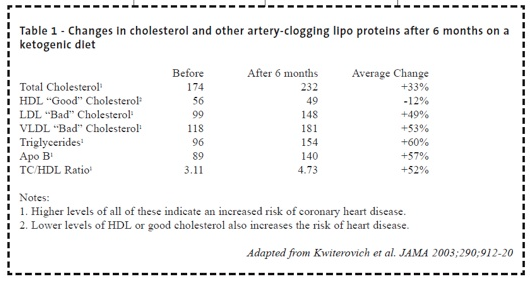Atkins Diet Raises Cholesterol
 The media has touted a recent spate of small studies comparing an Atkins-style ketogenic diet high in saturated fat and cholesterol to a more conventional diet as proof such a diet has little or no adverse effect on blood lipids or the risk of atherosclerosis. If a diet high in saturated fat and cholesterol does not raise “bad” (non-HDL) cholesterol levels and promote atherosclerosis this would turn 50+ years of nutrition research upside down.
The media has touted a recent spate of small studies comparing an Atkins-style ketogenic diet high in saturated fat and cholesterol to a more conventional diet as proof such a diet has little or no adverse effect on blood lipids or the risk of atherosclerosis. If a diet high in saturated fat and cholesterol does not raise “bad” (non-HDL) cholesterol levels and promote atherosclerosis this would turn 50+ years of nutrition research upside down.
Furthermore, all of these recent studies have done a poor job at achieving dietary compliance. Their results have been complicated because the subjects were often not at a stable weight when their blood lipids were checked. Nevertheless, proponents of ketogenic fad diets have claimed these studies show a diet high in saturated fat and cholesterol does not adversely impact blood lipids provided dietary carbohydrates are severely restricted. It is known that weight loss and calorie restriction improve blood lipids.1 One study found that the impact of losing about 25 pounds in moderately obese subjects was at least as favorable on blood lipids as reducing the percent of saturated fat in the diet by about 40%.2 Of course this same study showed that reducing dietary saturated fat coupled with weight loss was far more effective for improving blood lipids than weight loss on a diet high in saturated fat. An important question is what would happen to blood lipids and the risk of heart attacks if one followed a high-fat, ketogenic diet and maintained a healthful body weight? A recent study in the Journal of the American Medical Association, by Dr. Kwiterovich and associates, of 141 children showed very disturbing changes in blood lipids. These children, who maintained healthful body weights, followed a ketogenic diet to control their epileptic seizures.3 Table 1 below shows the average change in blood lipids after six months on a high-fat ketogenic diet. Children generally have lower LDL levels than adults do. However, the percent change in blood lipids in children in response to dietary changes is known to be essentially the same as adults. Therefore, the results of tthis study directly refute claims made by Atkins and others that diets high in saturated fat and cholesterol won’t adversely impact blood lipids if dietary carbohydrates are severely restricted. Indeed, the very large increase in total cholesterol levels observed was very close to what would have been predicted using formulas developed long ago by Dr. Ancel Keys and Dr. Mark Hegsted. These two nutrition research pioneers developed formulas to predict changes in cholesterol levels in response to changes in dietary fat and cholesterol.4 This study also examined blood lipids after one and two years in some of the children who continued to follow the ketogenic diet. The drop in HDL levels continued and “bad” cholesterol levels continued to remain much higher than they were at baseline.Diets very high in saturated fat and cholesterol, such as the one advocated by Atkins, dramatically increase “bad” or non-HDL cholesterol levels even if a healthful body weight is maintained and carbohydrate intake is kept very low. The adverse changes in blood lipids caused by such diets almost certainly promote atherosclerosis, heart attacks and strokes.
The bottom line: The adverse impact of ketogenic diets on blood lipids may be masked initially due to the favorable impact on blood lipids caused by a reduced energy intake and weight loss. Until more research is done on the long-term safety of an Atkins-style diet, the presumption should be that such a diet is likely to be atherogenic. The best bet for successful and long-term weight loss is a lowfat, high-fiber diet and plenty of exercise. By James Kenney, PhD, RD, LD, FACN. References: 1. Am J Clin Nutr 1992;56:320-8 2. J Lipid Res 1993;34:2183-91 3. JAMA 2003;290:912-20 4. J Am Coll Nutr 2000;19:578-90